'Spider-Man' And 'Prometheus': The Not-Even-Mildly-Amazing Blockbusters Of Summer
by Elmo Keep and Maria Bustillos
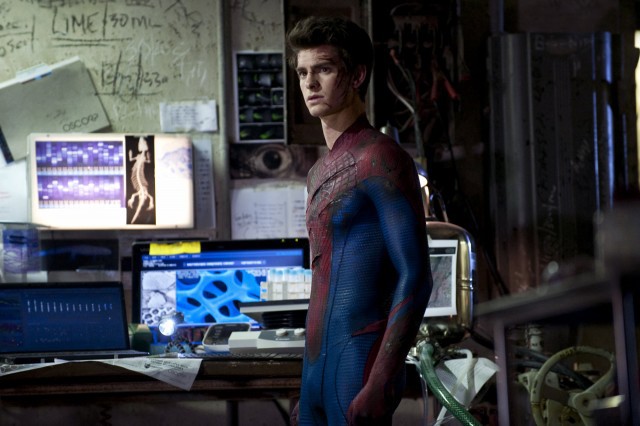
Having gabbed at some length regarding Hollywood’s abject betrayal of our cultural hunger for narrative, Elmo Keep and Maria Bustillos repaired to the movies to remedy the defects in their Summer Blockbuster education this weekend. Keep took in The Amazing Spider-Man, and Bustillos, Prometheus.
EK: I quite enjoyed the Spider-Movie!
MB: NO, Elmo.
EK: Tell me why this new one fails. It is pretty audacious I guess. You could not call something “The Amazing Prometheus.”
MB: They’re trying to be retro. And FAILING to be retro. O the terrible heart-clutching betrayal of this new Spider-Man.
MB: Here’s the thing. The myth of Spider-Man is that he’s an ordinary teenager who’s suddenly crushed by two terrible burdens: one, fate has brought him these superpowers, and two, he feels culpable in the death of his Uncle Ben. The whole pleasure of the story is in seeing him learn to bear his afflictions, and all that goes with them; to transcend the pain, but never forget it. You can always feel him looking back at the mistakes of his youth, choosing to do right because of the awful price he paid for his earlier moral failures. There’s hardly an adult who can’t cop to the same.
EK: Yes.
MB: Never again will Peter Parker “take the quick and easy path,” as they say in Jedi circles. So it’s crucially important that he remain morally consistent after the death of Ben. Where was this message in the new film? They were getting off on some kind of adorable-rebellious-goofball trip that completely undercut the origin story. Ugh, I felt just so horrible watching this thing.
EK: He certainly does not seem burdened in this film, skating around listening to Coldplay WHAT THE SHIT
MB: The worst is the robbery scene, which Sam Raimi handled immaculately in the 2002 version. Tobey Maguire’s Parker is visibly ambivalent about letting the robber escape. The moral question makes itself dimly evident to him even before Ben’s death. Just like anyone, the seeds of the responsible adult are present in the irresponsible, selfish child. Then the realization of his role in Ben’s death, facing the truth, causes the adult character to take root in him.
In the new Spider-Man, this episode is trivialized beyond all reckoning. There’s no relationship established between Garfield’s Spider-Man and the guy being robbed: the business about borrowing a penny for a chocolate milk couldn’t be more random or meaningless.
Basically, I thought they sacrificed the whole of the origin story to turning this Andrew Garfield into a rock star. Do Ya Think He’s Sexy. Well, fine.
EK: http://www.buzzfeed.com/mjs538/reasons-why-andrew-garfield-is-a-better-Spider-Man
MB: See, I find that a little bit depressing.
EK: Because I have little investment in Spider-Man, I quite enjoyed it on the entertainment level — some of it, particularly a moment at the end — was visually stunning, more so than Prometheus.
MB: Which one?
EK: When the blue cloud bomb goes off, that was beautiful.
MB: Oh yes. I thought both movies were beautiful, if a bit bludgeoning. But Prometheus. First things first. OMG what a GAWDAWFUL movie.
Elmo Keep: PLAY A FLUTE, ALIENS. It is the absolute worst.
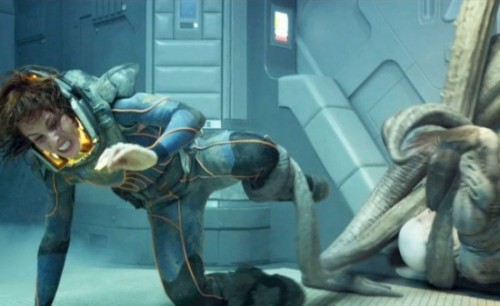
MB: At the end I was simply longing for them to tear everybody’s head off like Fassbender’s.
EK: If only!
MB: Rooting for the squelchy forced-blowjob octopus guys!!
EK: For Cthulhu, you are rooting.
EK: No amount of preparation for how bad it is can prepare you.
MB: They just squash Charlize Theron with a slowly-rolling spaceship, by golly.
EK: Dodge, Charlize! Sideways!
MB: Not quick enough, alas. And HOW much too much can we say about the magical insta-bortion machine.
EK: Never enough.
MB: With auto-stapling!
EK: Or, her incredible ability to STAND STRAIGHT UP and then go on some brief workouts, followed by some one-two, and rappel down these enormous cliffs.
MB: Yeah!! It’s SCIENCE.
EK: Ahahaha
MB: I do love Idris Elba, can I say. I would watch that man read a phone book.
EK: Truly he is delicious for my eyes.
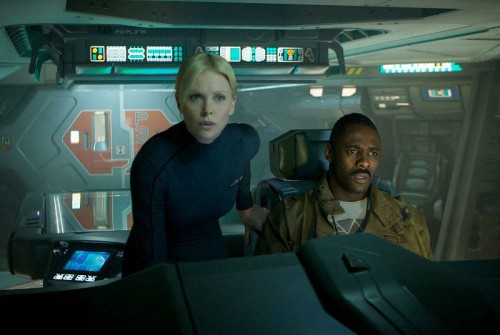
In this interview with the Prometheus writers, which is SO UNCOMFORTABLE it’s amazing, it comes out that from pitch to screen was 2.5 years&jmdash;that is extraordinarily fast.
MB: Hard-hitting reporting, there! “How comes it that you are so awesome, exactly?”
EK: Then there is the part where Damon Lindelof basically says that they as writers deliberately stopped caring about answering the plot questions halfway through the movie. “So we set up all these questions and then it’s like, forget about that! We’re in survival mode now, and it’s all action.” Which, fuck you.
This is the most transparent pitch for a sequel you could imagine. “Oh, it doesn’t make sense? Wait for the sequel! Please hire me, Damon Lindelof, not that other guy who pitched it first, to write it too.” Even if that sequel, should it eventuate, provides the most mind-alteringly satisfactory and challenging conclusion, I’ll still have residual anger because Prometheus was so terrible. Which is I think my anger still about “Lost,” actually. I was really invested in “Lost.”
MB: Crikey, this interview. “It explodes the archetypes of the universe in this Russian doll of fanatically connected ideas, which gets really interesting,” UGH no it doesn’t and that is when I clicked SHUT UP, YOU. Ludicrous, trying to dress up the penny-ante nihilism of this daft movie like “ideas,” or something.
(Does he mean “fantastically”? No no no noooo, whatever I don’t even.)
EK: What I don’t understand is, why is there not a script editor who is hired before shooting begins, to read the script with notes as to if or not it makes basic narrative sense. This seems like a minor storytelling investment to make. I should not have to read some dude’s insane 4500+ word Space Jesus theory (WHICH IS WRONG) about Prometheus after the fact in order to understand Prometheus. Prometheus should make sense on a basic storytelling level.
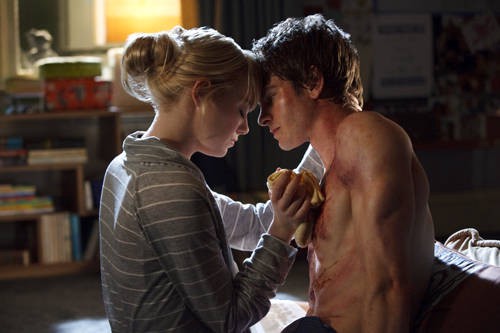
MB: I had the same thought over and over during The Not Even Mildly Amazing Spider-Man, and I have a terrible theory about it — namely, that a compelling narrative would be distracting from the sexy stars and the special effects. Same with The Avengers, the whole thing was reduced to the cute little catchphrases of each character, just like in that old episode of the “Simpsons”.
So after the movie maybe you will buy a poster of the sexy stars, maybe you will pay to see them in the next movie, exactly as you were intended to do. Maybe you’ll buy toys, games, etc. to do with the visuals, the effects. But the studio can’t sell you anything particular that is to do with the ideas or emotions called up by a story.
Not to say that this is a deliberately cynical policy, but like, if they have a choice between evoking narrative interest and including a gag or something “adorably sexy” (blech) or an explosion, they will choose those latter things.
EK: This is 100% true of Prometheus.
MB: Isn’t that a horrible thing even to think, that storytelling itself is being subverted by commercial considerations, not just now and then, but invariably?
EK: YES.
EK: And I wonder if it is even more basic, or base, than that, in that studios’ market research would indicate that giant explosions and special effects in themselves sell tickets. So forget story, 97% of the time.
EK: I felt this very much with Inception, too, even though I know we disagree there — that story was second to effects which looked like money being burned right before your eyes.
MB: O yes we super disagree there, I love that thing. So I am giantly looking forward to the next Batman, because I love Nolan’s movies.
EK: ARGH HATE SO MUCH
MB: Really?! Tell me, how come??
EK: BURTON FOREVER. I find Christopher Nolan films to be like big-budget art films that a very clever teenager has been allowed to make who has read a lot of existentialism.
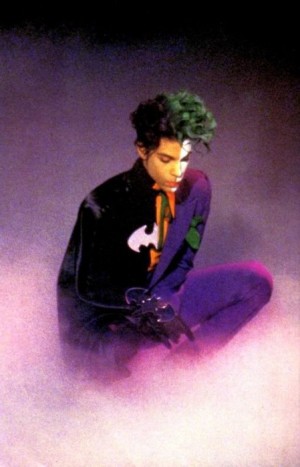
They lack for me an emotional resonance, and not in a Kubrickian way that is deliberate; they just feel hollow. Fleshed-out character relationships are a very distant second or third to how cool the film looks or how twist-laden the plot is. Like, The Prestige: “Ah ha! The trick was that you didn’t notice this film made almost no sense because WOW this twist and look at that dog with a fluffy tail!” There are vast tracts of The Dark Knight that make no sense; there feels like a whole reel is missing from the section where Commissioner Gordon disappears from the narrative, for instance.
My issue with all these big Hollywood action/sci-fi films that are supposedly “brainy” is that they are not. The Dark Knight, Inception, Prometheus, none of these make any narrative sense, but apparently they bamboozle us with their sheer cleverness and the crazy metaness of their concepts and set pieces that we aren’t meant to notice? We aren’t meant to catch that they say nothing thematically, but rather dangle a bunch of sorta-cool but mainly ponderous ideas in front of the audience and then do nothing whatsoever to explore them meaningfully?
MB: Haha that is so perfect, I am so guilty as charged, there. Even my kids say that I am an overgrown teenager. I guess I am still all brooding and existential deep down inside, and if I could get away with it I would still dress like a goth, maybe.
EK: I ride a baby bicycle TO WORK so I feel you.
EK: *baby blue!
EK: NOT BABY BICYCLE
MB: Now I am sad. I really, really wanted it to be a baby bicycle.
MB: Well… I think that Inception is very ambitious; I do think it touches on deeper themes meaningfully, and I love that movie a lot. But asking a movie audience to follow you into a world of abstractions, to explore the purposes of art and the relationship between artist and audience, which are the concerns of that movie as I understand it — that’s asking a lot. You’re right to the extent that Inception is not successful as a story. And that’s a real defect. But I think Inception is valuable as a document, something to be reexamined, reread like a book. For me it’s like Synecdoche, that way.
The new Spider-Man by contrast has very little to redeem it. It is mainly faithful to the idea that good-looking kids falling in love are fun to watch, which yes they are. Also, the photography and images in the movie are super gorgeous and inventive.
EK: But I have little investment in it as a universe. I was always team Bat. It was made very clear to me as a young that life was a contest and so I chose Batman, which was, I think, because of how affected I was by Burton’s Batman as a kid. So I was really into the Knightfall series of Batman comics when I was around twelve years old, and they really affected me also. I could barely read the “breaking of Batman” issue, it was too much. And this was very influential on the Dark Knight reboot, which is where I bring the sort of fandom level to it that you do to Spider-Man.
MB: Oh yeah, I am way more a Spider-freak. But always more than willing to perform inter-universal travel.
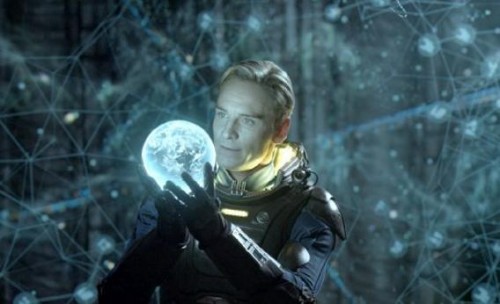
EK: There’s so much praise for how beautiful Prometheus is, which it most definitely is. But that’s kind of like praising the beauty of an Aston Martin; it’s extraordinarily expensive and made by expert craftspeople. Part of its function is to be beautiful. Prometheus is like an extremely beautiful car with no engine. Ridley Scott secured development money that was solely for putting together the design bible for the film, down to really minute details, before anything even got written. His background is design, so it is no surprise that he cared that much about those elements. It’s like he was so absorbed in getting things to look amazing that he just swatted away the writers, like, “Whatever you’re doing is fine!”
MB: HERE IS THE EXPENSIVE SPECIAL EFFECTS.
EK: Yes! But they worked for me in Spider-Man. Plus I cried three times! Maybe I was tired.
MB: I cried zero times. When did you cry?
EK: This Spider-Boy has a lot of FEELINGS, he cries often. Something about watching dudes cry.
When he screams on the roof when the commissioner dies, Uncle Ben (screaming again), and something that happened with Emma Stone, I think the part where he says he won’t let anything happen to her.
MB: He has feelings that appear to be all about himself; he more performs his feelings, for you to admire. Beautiful performance-crying, like Demi Moore in Ghost.
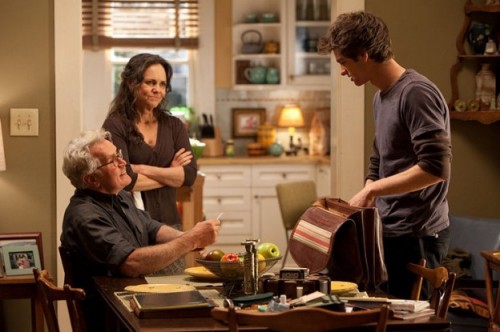
p.s. I loved the Morgenstern review where he is sticking up for Sally Field. It made him mad that she was so frumpy in it. “Blue-collar women wash their hair, too.”
EK: She certainly got over her husband’s death fast. And Spider-Boy just gives up looking for the dude who shot Uncle Ben? Okay.
MB: For reals?! on both things?!
EK: Plus it had too many spiders, a big problem for me.
MB: ONE SPIDER, please.
EK: WHUT, there was the ROOM OF SPIDERS
THAT FELL ON HIM
o_O
MB: Ah yes, the famous Keep arachnophobia.
EK: There was A LOT of inexplicable “doing science!” in this movie.
MB: The WORST doing science. Also: goes on Google, which I guess none of the other Science-Whiz kids knew how to do.
EK My boyfriend is very fond of yelling “Doing science!” at cop shows and forensic procedurals. “What’s happening here on this computer?” “Never you mind, just DOING SCIENCE!”
MB: Haha, my husband was a biochemistry undergrad and he goes plumb loco when they start showing animated DNA strands changing color and jitterbugging around.
EK: Also, Google my dead parents FOR THE FIRST TIME EVER.
MB: )*(%^$&(*^&
EK: Never really felt the threat of Dr. Cloverfield, either.
MB: Surprise! You didn’t happen to know that the girl you have a crush on at school is a Super Scientist with a gig at Super Science Corp. that has a lot of top-secret areas in there!! I guess you two aren’t in any classes together.
EK: Amazing!
MB: She’s a tour guide?! Very geniusy!
EK: And also it’s cool, yo. Just walk around our secret facility, no one will mind.
MB: Just wait for someone to enter a key code, you memorize it and boom! There you are in fluorescent hi-tech Spiderlandia.
EK: And her father is an amazingly loaded police chief!
MB: And you never knew!! That she is blisteringly rich with her police-commissioner dad!! He was probably close with Rudy Giuliani.
EK: This was the worst casting I have ever seen. There is no way to make Dennis Leary into someone we are meant to care about. All I can think about Dennis Leary is, “there’s the guy who stole from Louis CK” and is a terrible actor.
MB: Truer words.
EK: But! I LOVE Emma Stone, adore Emma Stone.
MB: LOVE EMMA STONE.
EK: Want to be BFFs with Emma Stone.
MB: But even the unending charm of Emma Stone is insufficient to make up for the BETRAYAL of Spider-Man’s failure to buy the eggs that his aunt had asked him to buy. Just, no no no no no. NO.
EK: It was all so we could have the lovely egg presentation scene later on. Look, I didn’t break the eggs!
MB: Right, it’s turned into another aren’t-I-adorable thing. A mockery. In Raimi’s version, Peter Parker at whatever cost produces the danged cranberry sauce for Thanksgiving dinner. Priorities. Teasing but very gently. “I had to beat an old lady with a stick to get these cranberries.” This is a matter of FIDELITY. To himself. To Uncle Ben. TO ME.
EK: I remembered the eggs! I swung them all over town and they are not an omelette!
MB: Seriously whatever, Spider-Boy, you are a self-infatuated boob who knows a little too well how fetching are those puppy-dog eyes.
Hence my egg-trauma.
EK: As a casual Spider consumer, I found the Raimi films to be this wholly complete immersive universe right off the bat. But this film, not so much.
MB: Totally.
EK: There was a lot of care in those, you could see. (And I really miss JK Simmons. He is the best! More “Law & Order” actors in feature films!)
MB: This speaks to a deeper problem, I fear, this thing I wanted to talk about most. There seems to have been a shift, even from ten short years ago when the Raimi Spider-Man came out. Because that is a spectacular piece of storytelling, at the risk of sounding like a total doof. That movie is about human qualities motivated by empathy, and the contrast and tension between eros and agape.
The scandalous Tad Friend profile of Ben Stiller in the New Yorker [paywall], “Funny is Money,” only reinforces the suspicion that American movies are in untrustworthy hands. Here is Stiller, just flabbergastingly, on the subject of filming “The Secret Life of Walter Mitty,” which it is pretty clearly going to be a complete catastrophe even though it is based on one of James Thurber’s funniest and most beautiful stories: “If I say to Fox that this movie is like ‘Little Miss Sunshine’ or ‘Eternal Sunshine of the Spotless Mind,’ they freak out, understandably, because they’re spending real money and they need to sell it as a big comedy.” Friend also quotes Tim Rothman, the CEO of Fox Filmed Entertainment: “The movie business cannot only make comic books and sequels, because at a certain point there would be no ‘Avatar 2’ or ‘Avatar 3,’ because there had been no ‘Avatar.’ At a certain point, probably now, you run out […] So we needed to make it happen, to take the big risk. […] Responsibly, and protecting your shareholders, make it happen.”
Lunacy aside, please note the clear suggestion that if it were remotely possible to continue coining it at the box office via just comic books and sequels, mes amis, that is exactly what we would be getting. At first blush this looks like cowardice, selfishness, the merest corporate careerism. Haven’t these guys seen The Player? (Or Jesus, maybe they have seen The Player.) Maybe the cravenness is so blatant because the recession has put so much pressure on everyone on the earth who wants to keep his job right now.
Even so, these statements demonstrate a moral, aesthetic and intellectual deficiency that carries straight into the heart of the culture. Here is the cost, if those who determine what we can see, share and talk about on the grand scale are frankly explaining that they are all about the shareholders. In this confiding tone, both Stiller and Rothman saying hey, it’s a lot of money! Understandably! — we just can’t afford to make good movies and we are too scared to try! No, not understandably.
EK: This is the great sadness of Prometheus for me. Going back to that Lindelof/ Spaihts interview for a moment, in it Jon Spaihts says it takes an auteur like Ridley Scott to sell a studio on an ambitious, huge film like Prometheus which is trafficking in ideas (in completely unoriginal ways, it turns out) like the Origin of Man™. This is the sort of thing that freaks out a studio spending millions of dollars! So, get in that guy who did the Star Trek reboot, that was popular? He can’t write an ending to save his life? Whatever! Just get that guy, he’s bankable. And then you get what you get in this ungodly mess of a film.
Elmo Keep is an Australian writer living in Ballarat, Victoria. Maria Bustillos is the author of Dorkismo and Act Like a Gentleman, Think Like a Woman.
Your Taxi Is Nasty
Guess what’s in the back seat of that cab you took? [SPOILER: vaginal or anal yeast. Also, doody
.]
Eastbound & Sound
by Luke Hopping

Content series are produced in partnership with our sponsors. This edition of “Summer Tracks” is brought to you by the new Acura ILX. Music is eternal, ever changing, and constantly influences the world around us. Acura understands the importance of music and provides technology for an optimal listening experience. Equipped with new features like the Pandora® internet radio interface, experience the power of music in your new Acura ILX.
Throughout its three-season run, I was consistently amazed by the resistance I encountered trying to turn my friends onto HBO’s Eastbound & Down. Some dismissed it as too dark, others too stupid. Their points had salience, I suppose, but comparing fans of Kenny Powers’s oafish misadventures to the proverbial gawkers unable to look away from a train wreck ignores all the heart this series had to offer. After all, when a train comes off the tracks, it stops. Kenny Powers does not. In spite of himself, Kenny doggedly refuses to give up hope that his overweight, middle-aged ass will one day return to its natural habitat on a Major League dugout bench. Ill informed (and proud of it), arrogant (and rightfully so), and, above all, determined, Kenny is practically the poster boy for American exceptionalism.
But what really cemented my emotional investment in Kenny’s journey was not the show’s unique brand of free-form Will Ferrellism, but its soundtrack. My faith that this insensitive redneck had any redeeming qualities whatsoever was inextricably linked to creators Jody Hill, Danny McBride, and Ben Best’s dazzlingly deployment of pop music. Those of you who have actually seen the show understand that eliciting sympathy for Kenny Powers this no small feat. Mad Men, Six Feet Under, and other series with more critically acclaimed soundtracks select music that is a bit too self-conscious for my taste. A song with a cheeky title that also conveniently summarizes a character’s dilemmas that episode? Clever! Their soundtracks add layers to be pored over with academic detachment, but fail to conjure much personal involvement. Eastbound’s music reinforces its characters’ most visceral and fleeting emotions. Whether it’s the accompaniment of Lee Hazlewood’s wry heartland-psychedelia during a somber jet skiing scene, or the use of the Ying Yang Twins’ millennial club banger “Wait (The Whisper Song),” to reignite the dormant relationship between Kenny and his baby mama, Eastbound challenges its fans to think outside the box when it comes to AV.
Acknowledging their own irreproachable taste, the creators released a two-disc compilation of the show’s music via Fat Possum Records shortly after the series concluded in April. While the album does some justice to Kenny’s exploits, the tracklist focuses exclusively on the show’s first two seasons. With summer fast approaching, and all of us in need of a new top-down, speakers-up playlist to bump, I’ve compiled a list of ten of the show’s stronger inclusions. While I’ve given up proselytizing the series for now, I holdout hope that its soundtrack will someday find the broader audience it deserves.
http://www.youtube.com/watch?v=V_ONyukSLqA
Going Down — Freddie King
Eastbound’s soundtrack is nothing if not eclectic, which is why its familiar intro theme can feel so comforting. Each episode begins the same way: an anti-social outburst cut short by the title credits in bold, 70s baseball font and the roar of blues legend Freddie King’s “Going Down.” Here, for the truly devoted, is every Eastbound & Down intro ever aired.
http://www.youtube.com/watch?v=hyjuN6AIbpE
My Love for You — ESG
This one was in the third season premiere, so it didn’t make the official compilation. ESG is/was (they’ve broken up and patched things up a couple times) an ensemble from the South Bronx that resists easy categorization. At various points in their career, they flirted with disco, funk, and post-punk. If you’re interested in the full extent of their musical range, contrast this track with the video above. Also, I implore you to checkout how the song was used in context.
http://www.youtube.com/watch?v=6O6ZxmQMqaA
Pour Man — Lee Hazlewood
All told, Lee Hazlewood’s music made three appearances in the series, once per season. Best known for his collaborations with Nancy Sinatra, the Eastbound boys were only interested in Hazlewood’s solo work, much of which is currently out of print. A lot of that, however, is a reflection of the music industry’s poor judgement and in no way a diminishment of the Psychedelic Cowboy’s considerable talent. Each of his contributions added a level of sigh-inducing, world weariness known only to those those whose greatness goes unrecognized. Perhaps the show’s writers sensed a bond, there.
http://www.youtube.com/watch?v=7fM8llpDvOw
A Fifth of Beethoven — DJ Daddy Ray Z
I think the song’s title, as well as the artist’s moniker, speak volumes, but, in case that isn’t enough, here’s a clip of how this track was employed to create one of the show’s more memorable scenes.
http://www.youtube.com/watch?v=XtS5Uajsf2o&feature;=related
Lady Luck — Richard Swift
Eastbound’s music department specialized in two things: making jet skiing appear introspective and placing the fate of mankind in Kenny’s mitt each time he took the mound (both executed in slo mo, naturally). Richard Swift’s “Lady Luck” sets the mood for one of our protagonist’s most momentous pitches. Take a listen; the recording quality had me convinced this was a real oldie, but apparently its author is a former member of the Shins.
http://www.youtube.com/watch?v=7MSesnyJuYk
Without You — Rainbow Arabia
Another stakes-raising windup song, another great example of the show’s musical versatility.
http://www.youtube.com/watch?v=NjYDWWd0zqc
Let’s Go Everywhere — Medeski Martin & Wood
Medeski Martin & Wood were an oddball jazz trio before releasing their children’s album Let’s Go Everywhere in 2008. Like pretty much all music in the series, this track initially seemed like an odd choice. Then again, if there’s a better way to reunite a walkout father with his equally degenerate son on an ATV course in rural Mexico without playing a children’s parody of “I’ve Been Everywhere,” I certainly haven’t thought of it.
http://www.youtube.com/watch?v=MimmTdn9314
Walk Like an Egyptian — The Bangles
The show’s debt to 80s pop culture cannot be stressed enough.
http://www.youtube.com/watch?v=P6ryWeZRWQE
He’s Alright — Kurt Vile
These are the moments when the show’s soundtrack is able to redeem Kenny’s otherwise reckless behavior. Say what you will about the show being juvenile or whatever (it’s kind of the point), this scene packs a punch and much of that is thanks to the contribution of Kurt Vile’s hair-raising “He’s Alright.”
http://www.youtube.com/watch?v=69zvFnVa03g
Sky Pilot — Eric Burdon & the Animals
Transforming a Vietnam protest song into an anthem of optimism and exuberance takes guts, but that’s exactly what Jody Hill, et al. did in the season one finale. Watch as Kenny’s personal assistant/sidekick/friend-slave Stevie (played by Steve Little) practically bursts with boyish glee, all to the tune of 1968’s “Sky Pilot,” a song about a cowardly chaplain. It’s a perfect example of how the show ignores lyrical content and goes straight for the raw emotion its music exudes.
This content was created for our sponsor the new Acura ILX.
Florida Will Kill Us All

Florida is going to stop killing itself person-by-person and will begin to eventually kill us all. While Rick Scott’s government kept a horrifying TB outbreak secret (while ordering the closure of the hospital that treated such!), let us not forget dengue fever outbreaks in the Keys and all that scary other stuff. Basically we need to wall off the subtropical portion of the United States before it’s too late, before crocodiles with hoof-and-mouth Legionnaires bird flu storm our gates.
What Was Your Favorite Sentence in the Barney Frank 'Vows'?
I think mine was this one: “The bridegrooms planned to wear tuxedos by Joseph Abboud, which Mr. Frank noted was a union shop.”
Delete Your Cell Phone

Do you get all bent out of shape with Facebook’s privacy settings and tracking? Because Facebook turns you into a marketing tool, and exposes your information to people you might not wish? Well, TOSS THAT IPHONE, pal! As you likely knew or suspected, the all levels of government are using cell-phone carriers early and often to find out where you are, who you’re talking to and what you’re talking about. (“Thousands of times a day”; Sprint alone gets on average 1500 requests a day.) And lots of this activity is warrantless or for “emergency” use — and lots of it is extremely broad, collecting data from an entire network tower. Your government is reading your sexts! It’s like a race between when your phone will give you cancer and when it will turn over your private conversations to the cops.
For Hollywood, Chinese Villains Move Behind the Scenes
by Abram Dylan

Back in May, when the original English report came out that China had censored Men In Black 3, it put the amount of cut material at 13 minutes.* A day later, when the Los Angeles Times picked up the story, the amount of censored material was revised to “at least three minutes.” But too late, everyone from E! to HuffPo had taken the story and run, the latter joking, “there could be a silver lining to the ‘Men In Black 3’ censorship: by cutting 13 minutes out of the film, Chinese theaters can screen the movie more times per day.”
Twelve days later, the L.A. Times ran a much-linked-to feature titled “Hollywood gripped by pressure system from China.” Its subhead: “To appease China and gain access to moviegoers and financing, movies include positive references to the nation (no Chinese villains!) and face censorship.” (!)
“Appease.” It just sounds so… dirty. But what it boils down to is that China is using its economic power to end Hollywood’s century-long stereotyping of China and Chinese people. (Villainously?)
The L.A. Times’ piece on China’s “pressure system” begins with an anecdote about how, in the recent high-profile action film Battleship, “it is the Chinese authorities in Hong Kong whom Washington credits with delivering the early proof that these invaders aren’t exactly homegrown.”
It immediately follows this observation by pointing out that in the comedy Salmon Fishing in the Yemen, “Chinese hydroelectric engineers showed off their know-how; the original book included no such characters.”
These examples, the piece concludes, reflect “conspicuously flattering or gratuitous additions” of references to the “Middle Kingdom” (shudder) meant “to satisfy Chinese business partners and court audiences in the largest moviegoing market outside the U.S.”
Now, if adding some Chinese engineers to the background of a film about a white Brit in Yemen is a gratuitous addition, one wonders how the Times would characterize the substitution of a white Brit in place of Jeff Ma, the real Chinese-American protagonist at the center of the movie 21? And what would the Times make of how the upcoming remake of Total Recall credits “Chinese physicist Xhu Lin” with the invention of the “Xhu-9 Synchropator,” the technology that allows for implanted memories? Chinese scientists and engineers? Crazy.
The Times immediately moved to note that these two instances of adding Chinese characters who know science (villains!?) isn’t the only pressure China is putting on Hollywood, but also, “Chinese bad guys are vanishing — literally.”
As an example, the article pointed to the 2010 remake of Red Dawn, which featured a brutal invasion and occupation of America’s west coast by China. The movie was shelved and then — in a move that is quite literally the embodiment of the old “they all look the same” mantra — China’s army was digitally reworked to be North Korea’s, a nation that apparently has no such “pressure system.” Red Dawn is now set for a November 2012 release.**
The idea that Chinese villains are “disappearing” in Hollywood forces a questions about what exactly it means to “disappear.” The Dark Knight, Tomb Raider 2 and Spy Game are just three blockbusters from the last decade or so that feature America’s biggest stars fighting Chinese villains. The Departed, a film adopted from a Chinese original, used Chinese villains to make the villains at the center of the film seem less villainous. It was nominated for five Oscars and won four of them.
Funny then that Men in Black 3, the very film that launched the most recent discussion of China’s film policy, features a bunch of “Chinese” villains. The scenes that underwent cuts in China feature alien villains disguised as Chinese restaurant workers.
So which is it? Is Hollywood no longer looking to central casting for villains, or is China’s brutal censorship system cutting them out?
Right from the first Telegraph piece, reports on the MIB3 cuts have focused on the removal of a short scene where a crowd of Asians has its memory erased by Smith and endorsed speculation — originally credited to by China’s “Southern Daily” newspaper — that “This could have been a hint on the use of internet censorship to maintain social stability,”
This narrative is great for two reasons. First, it fits perfectly into westerners’ idea of a paranoid freedom-crushing Chinese Communist authority — the kind that led the producers of the Red Dawn remake to choose China as an invading country in the first place.
Not that Chinese authorities aren’t often paranoid, but this game of “find the insult” is never ending. If China were that cautious about suggestive scenes and plot points, why would it have allowed the release this June of The Hunger Games, a tale about children from the peasantry killing each other for the amusement of overindulged, ostentatious rulers in the nation’s capital? (Though it was initially given a release date, Hunger Games was “delayed indefinitely” in Vietnam.) Why would they have allowed the release last summer of Kung Fu Panda 2, a film that opens with a pack of villains going to from village to village and violently collecting all the metal to be melted down at the behest of their megalomaniac leader, a spooky echo of the disastrous policies of the Great Leap Forward.
And if China is really that attentive to such suggestive detail, why would it allow, this month, the release of The Lorax, a cautionary tale about environmental destruction in the name of capitalism?
The other reason the paranoid China narrative focused primarily on the memory-erasing scene is how conveniently it shifts attention away from Hollywood’s horrible stereotyping of Chinese people. Yet the bulk of the cut scenes do just that.
In one removed scene, Tommy Lee Jones tortures “Mr. Wu” for information by repeatedly punching him in the face with a spiked alien fish. See, somewhere in his preposterously stereotypical Chinatown restaurant, Mr. Wu is harboring the film’s primary bad guy. (Many may recognize the actor playing Mr. Wu, Keone Yeoung, from his previous work on HBO’s “Deadwood,” where he was, yes, “Mr. Wu.”)
The film screened in China exorcises most of Mr. Wu’s torture (which is exactly what it is), as well as a scene where a Chinese female (villain) tries to take out Will Smith and another scene where Tommy Lee Jones pretty much beats a “Chinese” alien to death with a frying pan. For anyone with any perspective into modern China, the whole scene is an uncomfortable reminder of that nation’s still fragile psychological relationship with foreign powers. In fact, since other Neurolizer mind-wiping scenes were left in MIB3, it’s far more likely relevant Chinese censors were concerned that it was foreigners doing the mind-wiping, and not some suggestion about China censoring Weibo.***

Of the cuts, Kevin Ma, an Asian film industry observer and writer for LoveHKFilm.com, told me, “There are also as many fair-minded people in China as there are easily [insulted ones], and some netizens do see past the pandering and also doubt this lack of self-confidence. Nevertheless, it would appear that the charge of ‘hurting the feelings of the Chinese people’ is mainstream and here to stay, so there will be some effects as long as studios want to pander to China.”
None of the MIB3-inspired examinations of China’s influence on Hollywood bothered to mention that many of the major studios are currently under investigation by the Securities and Exchange Commission for illegally bribing Chinese officials for access to theaters and locations (villains!).
When American TV networks cut scenes it’s “edited,” and when China does it it’s “censored.” When Hollywood adds Hispanic characters and shies away from Mexican stereotypes, it’s catering to a growing demographic. When it changes the artistic integrity of Transformers 2,” Battleship, and — upcoming Chinese-financed, future Criterion Collection standout- — Iron Man 3, it’s “gripped” by a “pressure system.”
Transformers, Iron Man and Battleship are all three franchises that gave the U.S. military script oversight in exchange for cooperation. Was it a “pressure system” that “gripped” director Peter Berg when he cut a character from “Battleship” because the Navy thought a sailor looked too fat?
The good news is that there appears to be a solution to appease both China and Hollywood. Not only is China buying more tickets to Hollywood movies, but also China is increasingly funding those movies, resulting in “China cuts” of films. One of the biggest hits of 2011, the remake of The Karate Kid, was financed partly by China . In the version shown in the U.S., the young African-American kid from Detroit is set upon by a innately malicious gang of kung fu thugs from Beijing. In the version shown in China, the Chinese bad guys are less bad, more three-dimensional.
Then there’s Looper. After securing much needed financing from Chinese backer DMG, the upcoming Joseph Gordon-Levitt and Bruce Willis sci-fi film added Shanghai as a shooting location. Those scenes were scrapped for the version that will be seen America, but as the L.A. Times noted, the Shanghai footage “is being added back into the Chinese version.” Keeping the scenes came at the insistence of China’s DMG, a media agency founded and run by a New Yorker.
* Oddly enough, despite many later reports, including the L.A. Times’, The Telegraph story has not been corrected and still reports that MIB3 had been cut “by 13 minutes to remove all Chinese baddies from the film.”
** One “vanished” Chinese bad guy that is never mentioned alongside the Red Dawn example is the Chinese invaders from the recent THQ video game Homefront. Originally set in an America occupied by Chinese forces, the game changed to focus on an invading Asian conglomerate led by, yes, North Korea. Explaining the switch of enemy, an executive with THQ said the Chinese were “just not that scary.”
*** Ironically, Wiebo, the Twitter-like China microblog, is where reports of MIB3’s cut scenes first popped up. In an even greater instance of irony, uncut versions of MIB3 — selling for 5 yuan ($0.84) — were available on the street on pirated DVD days after the film’s China release. Meanwhile, ticket prices for the 3D version of the film in Shanghai were around 90 yuan ($15).
Related: The East is Drunk: Hammered and Sickled in China
Abram Dylan is the pseudonym of a journalist who writes about China. He can be contacted here.
How'd You Get There, Standup Comic Kate Wolff?
by Noah Davis

Kate Wolff always knew she was funny, but when her classmates growing up told her she was going to be on “Saturday Night Live,” she laughed and informed them she wanted to be a teacher. Well, life is funny sometimes. Teaching wasn’t the dream job Wolff envisioned, and although she still teaches middle-school art, she’s trying to make it in the brutally tough New York standup scene. In the basement of the Village Lantern where she produces a weekly show, Wolff talked about getting paid, incorporating her son into her act, and the process of toughening up for the stage.
How did you get here?
I went to college for art education, and I was a teacher right out of college. I liked it but I wasn’t thrilled with it. I was teaching elementary, and I wasn’t a little kid person at all. We did this thing called “bubbles in your mouth,” which involved pretending to blow bubbles, and I would always have to look away. It was horrible. I thought I would start liking teaching when I was in middle school or high school. I teach middle school art now, and it’s a good job, but it’s not a great creative outlet for me. About two years ago I got into comedy. Ever since my first mic, I knew it was what I wanted to be doing as a career.
How does one “get into” comedy?
In high school I was voted class clown. I was always interrupting my teachers, but they liked me. People would say that I was going to be on “Saturday Night Live” one day. I didn’t think so, though, because I was going to be a teacher. One of my good friends is a comedian, and he had me go to one of his shows. Afterwards, we were all hanging out and I was telling a weird story. He told me I needed to do comedy. I didn’t want to. I thought I would throw up on the stage. But he really thought it was for me. For about a month I practiced on my Mac computer. It was so nerdy. I would do my five-minute bit over and over and over. Finally, I signed up for an open mic.
I took it so seriously. I think I brought about 25 people, which the other comics ended up loving because it was a show for them. I did it. I went on stage, and I really did want to vomit and pass out. But I did it, and I did well for the first time. I got offstage and I didn’t even remember being up there. It was deer-in-the-headlights, but I knew I had to keep going.
How do you progress from there?
I kept doing open mics, and I started doing “bringer shows” where you have to bring four to eight people.
So you tried to make a lot more friends?
Yeah, exactly. [Laughs] Actually, before you start doing comedy you probably have friends. It’s when you start doing comedy that you lose them and all your friends become comics. They aren’t going to do a bringer for you.
I started a monthly show with my comic friend, and we’d try to trade spots to get on other shows. From there, it picked up. I interned. I barked here. I worked. And I still am working my ass off.
How many shows do you do a week?
My average is probably five or six a week. I have son, and I have him always on Monday and Tuesdays and on the weekends. During the school year, I try not to do shows on Mondays and Tuesdays, to stay home and be a normal mom for him, which is already tough for me. But now that school’s over, he came to my shows this week. Some people judge, but I don’t really care.
And I saw you use him in some of the videos. Does he like it? Does he understand what’s going on?
He loves it. He loves attention, dancing, and acting. Sometimes when I’m here, we’ll throw him onstage for a minute or two, and he loves it. He’s hysterical.
Do you make money doing comedy?
Not a living, that’s for sure. I’m just starting to get shows where I make money. I had a show a few days ago where I made the most money I’ve made so far. It was enough money that if I was getting it regularly, I would make enough. Most of the shows are not paid. Even the clubs in the city where comics are getting paid, it’s not a lot of money at all, especially during the week. Most comics make money on the weekends by traveling.
Is making this a full-time gig the goal?
Definitely. I would love to be doing it now if I could afford it, but I’m not there yet. It’s tough because you really want to get an agent. I’m focusing on that now, but in New York City, agents are flooded with actors, comics, and all sorts of other people. Unless they have heard of you, it’s hard.
It seems like YouTube would be another avenue for revenue or promotion.
All of us comics are trying to make videos that become viral. But even if you make a viral video, it will help, but it won’t guarantee long-term success. As a comic, you have to build for awhile, to build your material and your persona. You have to be vulnerable up there. It’s a mixture. You either have to have great jokes or be really charismatic and have that “it” factor like Kevin Hart. He has that sparkle. People want to be his best friend. They want to listen to him. But his joke concepts are good but they aren’t like George Carlin where you’re like, “whoa, I never thought of that before.” So, you have to be pure charisma and be really funny, or you have to be thinking of joke concepts that no one has put together before. It takes time.
Where do you fall?
I’m a perfect mixture of both. [Laughs] I definitely think I’m charismatic and goofy and have that funny jokester part of me. But I would like, and I haven’t gotten quite there yet, to have messages. I don’t just want to be up there telling stories about how I humped my couch when I was three. That’s funny, but I would like to go more Carlin-esque.
What’s the reaction you get when you tell people you’re a comic?
It’s all different. I had jury duty on Monday, and I was sitting next to this guy. I made the mistake of being nice to him for the first five minutes, and then he wanted to have hours of conversation. He kept asking if I got material. People always want to know if I’m going to talk about them. “No, you’re boring. I don’t want to talk about you.”
Did anyone give you advice when you were starting out?
Most of the tips came from comic friends. One of the best tips came from Andrew Schultz, who’s actually doing really well right now. He said, “just get funny. However you can do it, just get funny, and people will hear about you.” It takes time. Even if new comics are funny, it takes time to really get funny. You have so many defense mechanisms. You have to adjust to being on stage. That was the best advice.
Do you think it’s working?
I think so. I’m doing well. It helps that I’m a girl. I definitely have been sexually harassed and groped at different clubs. It’s not fun groping. It’s bad groping, so that’s a bitch. But you have to be tough to be in this industry, and I feel like all of that has made me tougher in a good way. I’m getting better at blocking out negativity. If you allow negativity in, it will break you. If you do things that are bad for your soul, it’s going to deteriorate you. I’ve gotten good at saying no to people and realizing my self worth.
I’m going to get flakey, but it’s been like a journey for me since I started comedy. I got divorced from my ex-husband, and I started comedy about a year later. It was me figuring out who I am, my strength, and getting more powerful.
Has that transferred to the rest of your life?
Oh yeah. I hate to say it, but no one can really fuck with me anymore. That doesn’t mean I’m above anything, but I’m going to speak my mind and stand up for myself. I’ve gotten so much stronger from getting divorced, being a single mom, and doing comedy. I may look cute, but I will emotionally stab you. [Laughs] It’s been a really cool process.
Where does it go from here?
I’m going to keep writing. I want my jokes to be at a higher level. I want jokes with premises that really tap into something. Carlin did something where he really made people aware of political issues and environmental issues while making people laugh at themselves. He was calling people out on their stupidity in a way that made them laugh about it. That’s a skill. I would like to get there. It doesn’t have to be environmental. I am vegan, so I would like to do some animal rights jokes, but it would be more about the suppression in society. We’re okay with violence but nudity and anything that relates to sex, people just get so uptight. I would like to somehow take those serious issues and make people laugh about it.
Who should I talk to next?
Leanne Mai-ly Hilgart. She founded Vaute Couture.
Previously: Christopher Hollowell Of Dun-Well Donuts
Noah Davis is frequently lost.
"I'm Not A Craigslist Computer Man"
I don’t get it, do people go out and shoot the melons, or are they just buying them to eat?
